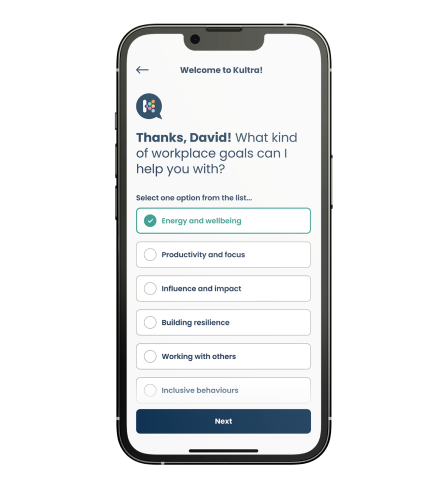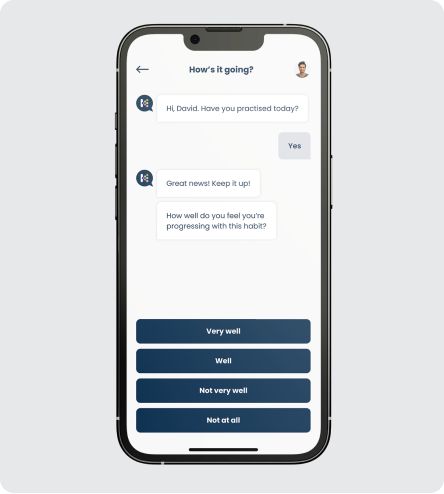Our Philosophy
Every person has it within themselves to develop their own potential.
The Challenge
Traditional learning initiatives are falling short and fail to deliver ROI.
Why?
We're not all the same
We have more diverse needs than ever before yet too often learning is too genericKnowledge and skills doesn't equal action
We tend to forget, become distracted or lose motivationThe world of work is changing
A top-down approach is too slow and too rigid
By fusing coaching and behavioural science,
Kultra® offers something different:

Kultra® provides access to powerful content on different ways to unlock potential.

Kultra® empowers self-directed action, tapping into human motivation and behavioural science to help coach and nudge new workplace habits to form.

Underpinned by academic research and behavioural science models of behaviour change.
Key scientific principles that power people potential
1. The Power of Intention
Kultra® has been engineered by our behavioural scientists to strengthen the attention, motivation and cognitive decision making processes of forming an intention to do something differently. Action will not happen without this step being formed.
Our content is designed to spark attention through personal goals, story-telling and bite-size information that feels relevant, easy to digest and personal.
Kultra® prompts an intention to take a specific action and guides you to make a conscious commitment to practise.

2. The Power of Nudging Towards Progress
The consistency of an action is driven by a cue in our environment, until it becomes automatic.
Kultra® draws on the behavioural science of nudge theory, to help cue the action that someone has committed to practising. We make the action as simple as possible to help maintain motivation in the flow of work.
New actions build over-time to develop new behaviours that stick. We call these habits.

3. The Power of Coaching Moments - Personal and Social
Exploring our potential is a journey that is personal and takes different twists and turns.
Kultra® uses self-reflective questions at every step of the journey and adapts to how well it is going for you.
Kultra®’s coaching moments use self-reflective questions to help you work through what is important to you, and allows you to choose a buddy and create a coaching community with peers.

In Summary
Our Coaching Philosophy
Kultra® is built on the foundational coaching philosophy of person-centred coaching. We reflect psychologist Carl Rogers’ approach of ‘unconditional positive regard’, a belief that the coachee, or thinker, has the ability to direct themselves towards more effective behaviours and choices.
This founding principle enables Kultra® to shape a content approach that poses questions to provoke deep self-reflection, and to trust that the recipient can take that thinking and exploration and use it positively to make new choices and form new behaviours. This evokes self-awareness and drives agency and empowerment. We see Kultra® most effectively deployed as part of a fully rounded talent strategy, which incorporates coaching, mentoring, training and effective performance management, alongside appropriate support for physical and mental wellbeing.
Kultra® is not intended to replace human coaching. The presence, intuition and sophistication required from interactions with a human coach cannot be replicated by a digital self-coaching experience. Nevertheless, the content and approach within Kultra® draws on the philosophy and ethical frameworks of human coaching and delivers a variety of coaching approaches on a much larger scale across an organisation at a more cost-effective price point than can be achieved by human coaching.
Through our ongoing discovery process, we are continually exploring how we can reflect coaching modalities impactfully in the digital self-coaching user journey.

